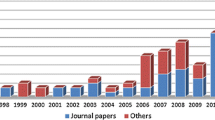Abstract
In container terminals, the actual arrival time and handling time of a vessel often deviate from the scheduled ones. Being the input to yard space allocation and crane planning, berth allocation is one of the most important activities in container terminals. Any change of berth plan may lead to significant changes of other operations, deteriorating the reliability and efficiency of terminal operations. In this paper, we study a robust berth allocation problem (RBAP) which explicitly considers the uncertainty of vessel arrival delay and handling time. Time buffers are inserted between the vessels occupying the same berthing location to give room for uncertain delays. Using total departure delay of vessels as the service measure and the length of buffer time as the robustness measure, we formulate RBAP to balance the service level and plan robustness. Based on the properties of the optimal solution, we develop a robust berth scheduling algorithm (RBSA) that integrates simulated annealing and branch-and-bound algorithm. To evaluate our model and algorithm design, we conduct computational study to show the effectiveness of the proposed RBSA algorithm, and use simulation to validate the robustness and service level of the RBAP formulation.
Similar content being viewed by others
References
Brown, G. G., Lawphongpanich, S., & Thurman, K. P. (1994). Optimizing ship berthing. Naval Research Logistics, 41(1), 1–15.
Cheong, C. Y., Tan, K. C., Liu, D. K., & Lin, C. J. (2008). Multi-objective and prioritized berth allocation in container ports. Annals of Operations Research, 180(1), 63–103. doi:10.1007/s10479-008-0493-0.
Imai, A., Nishimura, E., & Papadimitriou, S. (2001). The dynamic berth allocation problem for a container port. Transportation Research. Part B: Methodological, 35(4), 401–417.
Imai, A., Nishimura, E., & Papadimitriou, S. (2003). Berth allocation problem with service priority. Transportation Research. Part B: Methodological, 37(5), 437–457.
Imai, A., Nishimura, E., Hattori, M., & Papadimitriou, S. (2007). Berth allocation at indented berths for mega-containerships. European Journal of Operational Research, 179(2), 579–593.
Kim, K. H., & Moon, K. C. (2003). Berth scheduling by simulated annealing. Transportation Research. Part B: Methodological, 37(6), 541–560.
Lambrechts, O., Demeulemeester, E., & Herroelen, W. (2008). Proactive and reactive strategies for resource- constrained project scheduling with uncertain resource availabilities. Journal of Scheduling, 11(2), 121–136.
Leus, R., & Herroelen, W. (2007). Scheduling for stability in single-machine production systems. Journal of Scheduling, 10(3), 223–235.
Li, C. L., Cai, X., & Lee, C. Y. (1998). Scheduling with multiple-job-on-one-processor pattern. IIE Transactions on Scheduling and Logistics, 30(5), 433–445.
Lim, A. (1998). The berth planning problem. Operations Research Letters, 22(2–3), 105–110.
Moorthy, R., & Teo, C. P. (2006). Berth management in container terminal: the template design problem. OR-Spektrum, 28(4), 495–518.
Nishimura, E., Imai, A., & Papadimitriou, S. (2001). Berth allocation planning in the public berth system by genetic algorithms. European Journal of Operational Research, 131(2), 282–292.
Park, Y. M., & Kim, K. H. (2003). A scheduling method for berth and quay cranes. OR-Spektrum, 25(1), 1–23.
Van de Vonder, S., Demeulemeester, E., & Herroelen, W. (2008). Proactive heuristic procedures for robust project scheduling: an experimental analysis. European Journal of Operational Research, 189(3), 723–733.
Wang, F., & Lim, A. (2007). A stochastic beam search for the berth allocation problem. Decision Support Systems, 42(4), 2186–2196.
Yan, S., & Chang, C. (1998). A network model for gate assignment. Journal of Advanced Transportation, 32(2), 176–189.
Yan, S., & Huo, C. (2001). Optimization of multiple objective gate assignments. Transportation Research. Part A, Policy and Practice, 35(5), 413–432.
Yan, S., Shieh, C., & Chen, M. (2002). A simulation framework for evaluating airport gate assignments. Transportation Research. Part A, Policy and Practice, 36(10), 885–898.
Yu, G., & Qi, X. T. (2004). Disruption management: framework, models and applications. Singapore: World Scientific.
Zhang, C., Liu, J., Wan, Y., Murty, K. G., & Linn, R. J. (2003). Storage space allocation in container terminals. Transportation Research. Part B: Methodological, 37(10), 883–903.
Author information
Authors and Affiliations
Corresponding author
Rights and permissions
About this article
Cite this article
Xu, Y., Chen, Q. & Quan, X. Robust berth scheduling with uncertain vessel delay and handling time. Ann Oper Res 192, 123–140 (2012). https://doi.org/10.1007/s10479-010-0820-0
Published:
Issue Date:
DOI: https://doi.org/10.1007/s10479-010-0820-0




